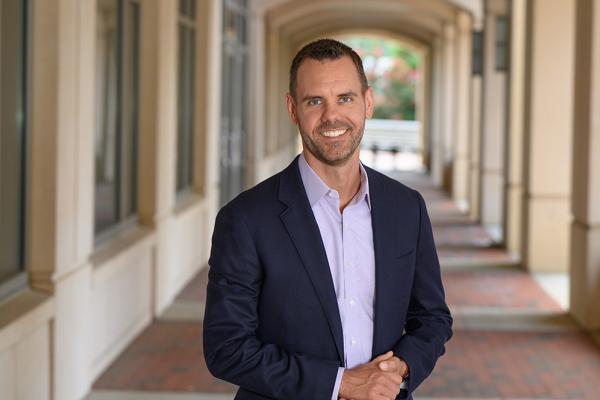Kurt Gray appointed as inaugural C-SPAM faculty director

Leading moral psychology expert Kurt Gray has been appointed to head The Ohio State University’s new Collaborative on the Science of Polarization and Misinformation (C-SPAM) starting in autumn 2025. He will also join the faculty of the Department of Psychology as the first Weary Foundation Endowed Chair in the Social Psychology of Polarization and Misinformation, a position that with C-SPAM is supported by a recent $5 million gift from Gifford Weary and her family foundation.
With deep expertise on the values and ethical frameworks that guide human behavior, Gray will both expand the focus of the university’s social psychology program and shape the innovative work of C-SPAM, an interdisciplinary initiative dedicated to understanding the psychological factors behind some of the 21st century’s greatest threats: the deepening of societal divisions and the wide-scale spread of false information
“Kurt is among the field’s most prolific and influential scholars. His program of research concerning moral judgments offers an insightful theoretical lens for understanding the escalation and reduction of political polarization,” said Russell Fazio, Harold E. Burtt Chair in Psychology, who chaired the search committee for Gray’s position. “He will be a tremendous asset to C-SPAM and the Department of Psychology.”
Gray is the spouse of Kristen Lindquist, who will also join the Department of Psychology in autumn 2025 as the Robert K. and Dale J. Weary Chair in Social Psychology. She is a world-leading scholar who researches the psychological and neural basis of emotions, moods, feelings, and ultimately, health and wellness.
Currently a Professor in Psychology and Neuroscience at the University of North Carolina at Chapel Hill, Gray uses interdisciplinary methods to study deeply held human beliefs and what shapes them, such as religion, politics, artificial intelligence, and social media. He also explores new ways to bridge moral divides. He directs both the Deepest Beliefs Lab and the Center for the Science of Moral Understanding at UNC Chapel Hill, and is the author of Outraged: Why We Fight about Morality and Politics and How to Find Common Ground, forthcoming from Pantheon Books in 2025.
“A lot of past work argues that the morals of liberals and conservatives are so different. They have different minds and will never agree. That’s a really terrible place to be: ‘You’re from Mars and I’m from Venus – I guess we’ll always be aliens to each other,’ ” Gray said.
Gray's work challenges this idea and demonstrates that polarization is not rooted in fundamental difference; instead, it stems from moral disagreement and safety concerns common among all humans. People’s desire to protect themselves and their families drives political and other divisions, he explained. For example, on either side of the thorny national debate about gun control are people who feel threatened: some by the inability to defend themselves against violence without a gun, and some by gun violence itself. Recognizing this thread, he said, offers new possibilities for healing social rifts, as well as a hopeful perspective that is sorely needed.
Gray also sees polarization as an inherently interdisciplinary problem that spans fields including psychology, politics, information processing, communication, computer science, and philosophy, among others. As such, it requires an interdisciplinary solution – which is what C-SPAM aims to provide, and where Ohio State excels. The collaborative will connect experts across fields to facilitate research with implications for national security, public health, sustainability, and other sectors.
“Trying to fix complex social problems can be a little bit like whack-a-mole,” he said. “You address one thing, but if you don’t understand the whole system, fixing that issue might create other problems. This is why I think it’s so essential to get all of these different fields together."
Gray’s background makes him a particularly ideal faculty director for the collaborative, said Duane Wegener, chair of the Department of Psychology, who has overseen C-SPAM’s development since it first received funding. Most of the collaborative’s research to date has focused on the psychological factors behind the spread and durability of misinformation: Recent studies have examined the effectiveness of human and automated fact-checkers, as well as predictors of misinformation-fueled extremist acts. With his expertise in moral psychology, Gray will help build out the collaborative’s other major focus on polarization, including both its root causes and potential solutions.
“The combination of Kurt’s expertise with that of other faculty in the department will allow us to create a vibrant group of researchers who bring together existing strengths,” Wegener said.
He emphasized that Gray will likewise be a valuable addition to the broader department, which has been widely recognized for its social psychology research and coursework on attitude change and persuasion. Gray will expand offerings to include undergraduate courses on the science of moral understanding, which cover moral debates and conversation techniques, as well as graduate courses on moral psychology and mind perception, among others.
Asked about his vision for his role at Ohio State, Gray emphasized that he would like to advance the visibility of C-SPAM and the Department of Psychology, both on campus and within the community. To that end, he is already planning a July 2025 conference that will offer guidance for publishing and engaging audiences with research on polarization and misinformation. More broadly, he hopes to establish the university as a leader in these very topics – by building on the interdisciplinary, collaborative atmosphere that has long distinguished Ohio State.
“There are so many people at Ohio State doing excellent work,” Gray said. “I’m really excited to draw people in from various disciplines and use the collective brain trust to better study and address these issues.”

